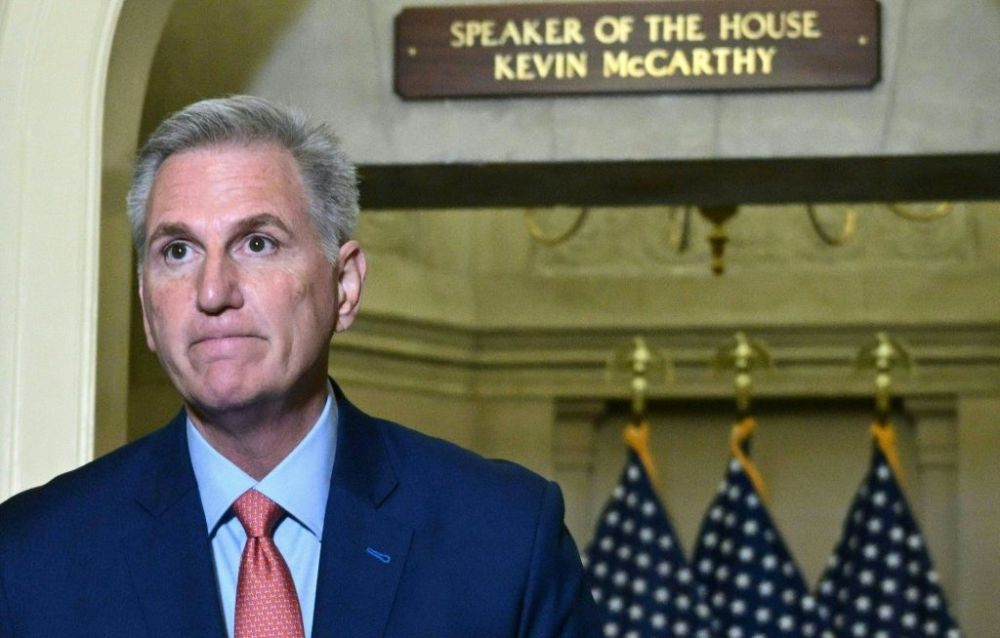Stop us if that sounds familiar: A group of far-right House Republicans is threatening Kevin McCarthy’s grip on the speaker’s gavel in an effort to extract concessions.
It’s happening again, this time on the House’s first day back from summer recess. Nine months after his grueling fight for the role, Speaker McCarthy is now fighting back his detractors on two fronts: whether to shut down the government at the end of the month, and whether to launch an impeachment inquiry into President Joe Biden. He relented on the latter earlier today. The question now is how much power McCarthy’s critics in the House Freedom Caucus (HFC) have to force the speaker to give in on their demands—and whether they can oust him from his perch if he doesn’t.
Issue 1: Funding the government or shutting it down.
Now that the House is back from recess, lawmakers have only 11 working days until funding for the federal government expires on September 30—unless lawmakers can negotiate a deal before then. McCarthy needs 218 votes to pass a spending compromise, meaning he can only afford to lose four of the 222 Republican members of the House, assuming Democrats vote unanimously in opposition to the GOP plan.
Over recess, McCarthy said he wants to pull together a stopgap measure—known as a continuing resolution (CR)—to extend government funding at current levels for a few months while the House negotiates the 12 annual appropriations bills for fiscal year 2024.
That’s a nonstarter for some in his own party, like House Freedom Caucus (HFC) Chairman Scott Perry, who said at a press conference Tuesday that the group won’t support a short-term government funding bill. During recess, the HFC presented a list of demands—including government funding bills written at austere levels, opposition to additional aid to Ukraine, clamp-downs down on the U.S.-Mexico border, and policy reforms at the Justice Department and the Pentagon—in order to win their support and ward off a shutdown. Now some are saying that they should pass all 12 government funding bills by October 1 without relying on a temporary solution.
Rep. Matt Gaetz of Florida, a Republican and longtime McCarthy critic, claimed in a floor speech Tuesday that the speaker was “out of compliance” with the deal he brokered with conservatives in January to win the speaker’s gavel. The exact details of the deal still remain nebulous, but Gaetz’s demands for McCarthy include votes on term limits for members, public release of January 6 surveillance videos, budget cuts, and impeachment. His goal is to bring McCarthy into “immediate, total compliance” with the deal, or to remove him from the speakership.
A “clean” CR—one that does not contain any policy riders or changes conservatives want—would also trigger Gaetz making a motion to vacate, he said.
But any CR will have to pass through the Democratic-controlled Senate before reaching Biden’s desk, complicating the hardliners’ efforts to include conservative priorities. The same challenges apply to the 12 separate bills the House needs to pass to fund the government for the entire fiscal year. House appropriators, in order to appease some Republicans unhappy with the debt ceiling deal McCarthy and Biden made in May, have written the appropriations bills to spending levels well below the Senate’s.
The two chambers will have to reconcile their separate versions of the legislation, but McCarthy also needs to avoid alienating so many conservatives that he has to turn to Democrats to pass the stopgap spending bill, according to one Capitol Hill staffer with a leadership-aligned GOP member. “It would be suicide if he did make a deal with the Democrats,” the staff member tells The Dispatch. “That would be the point where they would say, ‘Okay, we’re going to bring up the motion to vacate.’”
Issue 2: Opening an impeachment inquiry.
Impeachment is the other issue on which McCarthy has faced some heat from his fellow Republicans.
Gaetz signaled his desire for such a showdown with McCarthy last week, telling a conservative commentator that impeaching Biden should be House Republicans’ top priority. “If Kevin McCarthy stands in our way, he may not have the job long,” he said.
McCarthy, seeking to head off such criticism, announced this morning that the House will open an impeachment inquiry into Biden over his business dealings with his son, Hunter Biden, and other family members. “Today I am directing our House committee to open a formal impeachment inquiry into President Joe Biden,” the speaker said. “This logical next step will give our committees full power to gather all the facts and answers for the American public.”
The inquiry will be led by the chairmen of the House Oversight, Judiciary, and Ways and Means Committees, which have been working for months on various investigations into the Biden family’s financial dealings. They’ve yet to uncover smoking-gun evidence tying Joe Biden to criminal behavior, but their findings do raise a number of questions about the then-vice president’s involvement in his family’s business dealings.
But the move itself represents a flip-flop for McCarthy, who had previously said an impeachment inquiry should happen after a vote on the House floor, “not through a declaration by one person.” And that’s where the tight math in the House matters: Republicans “don’t have the votes” for impeachment, Rep. Ken Buck, a Colorado Republican, told Jen Psaki on her MSNBC show Sunday, forcing McCarthy to unilaterally announce the inquiry without the authorization vote.
Whether the move will be enough to appease HFC critics remains to be seen. “This is a baby step following weeks of pressure from House conservatives to do more,” Gaetz said on the floor of the House after McCarthy’s announcement.
How serious is the threat against McCarthy?
McCarthy got himself into this predicament. He won the speaker’s gavel in January, but only after making a deal with the hardline members of his party that would allow a single member to trigger a motion to “vacate” the speaker’s chair. Assuming all members are present and voting, (and he doesn’t have support from Democrats) he can only lose four Republicans on a motion to vacate the chair vote and retain the speakership. But McCarthy could face some attendance issues: House Majority Leader Steve Scalise is receiving treatment for multiple myeloma, and Rep. Chris Stewart, a Utah Republican, is retiring on Friday due to his wife’s health concerns. His replacement will be decided in a November special election.
Still, while it only takes one member to call for a motion to vacate the chair, majority support is necessary to actually, well, vacate it. And with no consensus alternative presenting themselves at the moment, McCarthy’s allies believe the speaker will survive any such challenge.
Bottom line? The next few weeks could be chaotic, but don’t expect to see a dejected McCarthy lugging his stuff out of the speaker’s office anytime soon. “He’ll probably work out a deal with the Freedom Caucus members,” the Hill staffer tells The Dispatch. “I think they’re just trying to get as much leverage as possible right now before they even start negotiations. He always somehow comes through with a deal.”
Gaetz has floated on X, the platform formerly known as Twitter, that he would be willing to work with Democrats on various legislative priorities, such as banning congressional stock trading, to “rid the House of ineffective leadership.”
But Republican strategist Liam Donovan pointed out that Gaetz knows his plan is unlikely: “The only reason to even float this nonsense” is to “reverse engineer a news cycle about whether Dems will save him (rather than the fact that only a tiny sliver of the conference would vacate.)”
“Most of us came here to govern,” Rep. Greg Landsman, a Democrat from Ohio, told Axios. “Not indulge Matt Gaetz when he has one of his tantrums.”
An early test for McCarthy comes midweek, as the House is planning to consider one of the 12 bills that have to pass to fund the government for fiscal year 2024, this one for the Pentagon. Some HFC members are threatening to withhold their support on an initial procedural vote on the measure if McCarthy won’t first agree to set topline discretionary spending limits for 2024. How difficult a time McCarthy has getting the bill to the floor and through the House could signal how tough a battle the overall funding fight will be.
Meanwhile, some more moderate Republicans are worried that deep spending cuts could backfire, harming their districts or even the GOP’s ability to retain control of the House. Polling in recent years has found that Republicans have taken the brunt of public blame for government shutdowns.
“We’re definitely headed for a shutdown,” another staffer for a moderate Republican member tells The Dispatch. But McCarthy will be fine, he predicts. “People that voted for him 15 times in January aren't just going to turn on him right now.”
At least one of those people, Rep. Don Bacon, co-chair of the centrist GOP Main Street Caucus and member of the bipartisan Problem Solvers Caucus, agrees. “We had 200 of us in January who said we’d vote for McCarthy 50 times, and we haven’t changed,” the Nebraska Republican tells The Dispatch. “When it comes to McCarthy, I think support from the 200-plus has always been there and always will be.”
On the Floor
Lawmakers will vote this week on a trio of Iran-related measures: One bill would impose sanctions on individuals, countries, and entities with ties to Iranian missiles and related technologies. Another bill would sanction the supreme leader and president of Iran. Yet another condemns Iran’s persecution of religious minority groups and its human rights violations.
They will also consider various agriculture bills. One bill would require the secretaries of the Agriculture and Interior Departments to conduct reports on reducing hazardous fuels, another would require an evaluation on aerial firefighting systems, and another would require California’s Shasta-Trinity National Recreation Area to collect marina fees.
On Tuesday, the Senate began consideration of a “minibus” comprised of three bipartisan spending bills —on agriculture, transportation and housing, and military and veterans affairs. An initial procedural vote on the measure to end debate on the measure and move it forward (called invoking cloture) was approved on a wide bipartisan basis of 85 to 12. The Senate will also vote on various executive and judicial nominations.
Key Hearings
- The House Homeland Security Committee held a hearing at the 9/11 Memorial Museum Tuesday on evolving threats in a post-September 11 world. Information and livestream here.
- Gary Gensler, U.S. Securities and Exchange Commission chair, testified on an oversight hearing the Senate Banking Committee held Tuesday. Information and livestream here.
- There are also several hearings focused on artificial intelligence this week: On Tuesday, the Senate Commerce Committee held a hearing on “the need for transparency” in AI, (livestream available here,) and the Senate Judiciary Committee held a hearing on legislating on AI. Livestream available here. On Thursday, the Senate Homeland Security and Governmental Affairs Committee will hold a hearing on governing AI “through acquisition and procurement.” More information is available here.
- The House’s select committee on China will hold a hearing Wednesday on the Chinese Communist Party’s propaganda and censorship. The committee will hear from experts at Freedom House, Garnaut Global, and Radio Free Asia. Information and livestream available here.
- The House Financial Services Committee will hold an oversight hearing Wednesday on the Committee on Foreign Investment in the United States that features Treasury Department officials. Information and livestream available here.
- The Senate Homeland Security and Governmental Affairs Committee will hold a joint hearing Wednesday examining the proposed PGA-LIV merger and Saudi Arabia’s public investment in the United States. Information available here.
- Colette Peters, director of the Federal Bureau of Prisons, will appear before the Senate Judiciary Committee for an oversight hearing Wednesday on the Federal Bureau of Prisons. Information available here.
Of Note
Thank you for reading and supporting The Dispatch. If you value the work we’re doing, you can help us grow simply by forwarding this email to anyone you think would appreciate our work. They can sign up for the Uphill and a Dispatch account from the link at the top of this email.






Please note that we at The Dispatch hold ourselves, our work, and our commenters to a higher standard than other places on the internet. We welcome comments that foster genuine debate or discussion—including comments critical of us or our work—but responses that include ad hominem attacks on fellow Dispatch members or are intended to stoke fear and anger may be moderated.
With your membership, you only have the ability to comment on The Morning Dispatch articles. Consider upgrading to join the conversation everywhere.